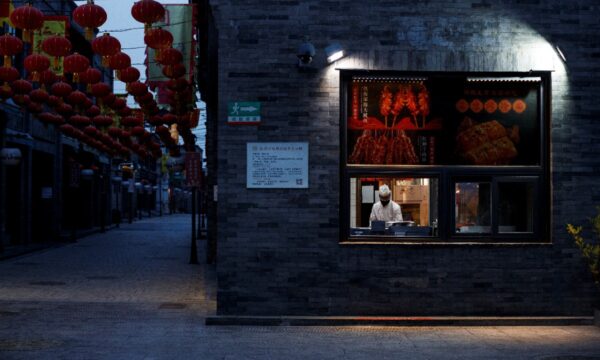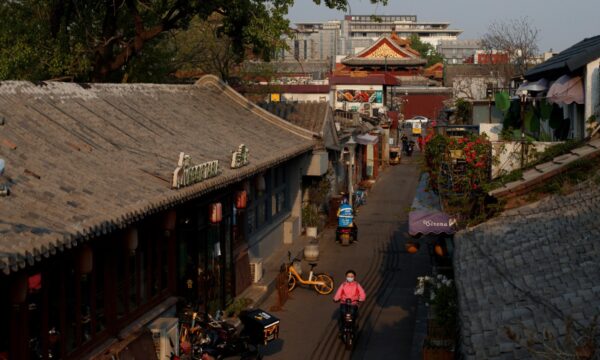Business
Spring Yet to Come: Small Businesses at Beijing’s Tourist Hot-Spots Struggle

BEIJING—For Zhang Yu, who runs a cafe in one of Beijing’s top tourist spots, business has never been so bad.
To contain the spread of the CCP (Chinese Communist Party) virus, commonly known as novel coronavirus, bars and cafes in the Wudaoying hutong—a top Lonely Planet destination built around a narrow lane—are permitted to provide take-away services only. Non-residents must show proof they have an appointment to enter the area.
Added to which, tourism has plummeted.

“Don’t mention it! This is supposed to be the peak season,” said Zhang, who has run her cafe for five years. “But there are almost no customers as they (authorities) don’t want to have people hanging around here.”
While China’s manufacturing and retail sectors are starting to get back to work, tourism sites in Beijing remain a shadow of their former and bustling self.


China’s capital city has maintained the highest level of emergency response to the outbreak, so tourist attractions like the Forbidden City remain closed. A 14-day quarantine for new arrivals has stifled travel.
As a result, small business owners running restaurants, souvenir shops, and tourism agencies are struggling.
Only a little over 20 percent of tourism-related businesses in Beijing had resumed operation as of the three-day Qingming national holiday in early April, a survey by on-demand delivery service giant Meituan Dianping showed.
Hanging On
The only people present in Wudaoying on a recent afternoon were a few elderly residents sitting outside to enjoy the spring sunshine. A cat made its way lazily through empty rooftop bars.


Business
Russia’s Booming Economy is Straining a Vital Trading Route with China

Russia’s railway industry is experiencing a significant downturn, with a nearly 30% investment cut and a 5% freight volume decline, complicating trade with China amidst the economic impacts of the Ukraine war.
Downward Trend in Russia’s Railway Industry
Russia’s railway industry is currently experiencing a significant downturn, largely due to the impacts of the ongoing conflict in Ukraine. According to MMI Research, this sector is facing its biggest slowdown since the Great Financial Crisis, with freight volumes dropping by 5% in the first 11 months of 2024. The war-driven economy has hindered trade, particularly with China, which heavily relies on rail transport.
Investment Cuts and Economic Consequences
Investment in Russia’s railways is set to decrease by almost 30% next year, dropping to 890 billion rubles (approximately $8.5 billion). This reduction is attributed to high interest rates, currently at a record 21%, which further complicate financing options. The state-owned Russian Railways is reconsidering future investments, indicating potential cuts by another third through 2030.
Challenges Affecting Trade with China
The decline in rail capacity poses significant challenges for Russia’s trade with China. As Western sanctions push Russia to diversify its trade routes, rail transport has become increasingly vital for moving goods. However, supply bottlenecks, exacerbated by the need to transport war-related materials, threaten to disrupt this crucial trading relationship further.
Source : Russia’s overheated economy is squeezing one of Moscow’s key trading channels with China
Business
Democrat Claims Musk is Undermining Spending Bill Due to China Restrictions – The Hill

A Democrat claims Elon Musk influenced the reduction of a spending bill due to its restrictions on China, suggesting his actions impacted the legislation’s progress and funding allocation.
Allegations Against Musk
A prominent Democrat has accused Elon Musk of deliberately sabotaging a significant spending bill in response to China-related restrictions. This accusation comes amid ongoing tensions between the U.S. and China, particularly regarding technology and trade policies. The claims suggest that Musk’s influence is affecting critical legislative processes, raising concerns among lawmakers about foreign influence in American politics.
Implications for Legislation
The potential ramifications of Musk’s alleged actions could be significant. As a major player in the tech industry, his decisions can sway public opinion and impact the economy. Lawmakers fear that if influential figures like Musk oppose necessary legislation, it might hinder efforts to address vital issues such as national security and economic stability.
Political Reactions
The controversy has sparked debates among both Democrats and Republicans, highlighting the intersection of technology and politics. Many are demanding greater transparency and accountability from tech giants. As the situation unfolds, lawmakers may need to reassess their strategies to ensure that essential legislation moves forward uninterrupted.
Source : Democrat accuses Musk of tanking spending bill over China restrictions – The Hill
Business
HSBC Chairman to Head Key UK Business Delegation to China

HSBC Chairman Mark Tucker will lead a UK business delegation to China next month to boost trade and investment, amid concerns over national security and improving UK-China relations.
HSBC Chairman Leads UK Delegation to China
HSBC Chairman Mark Tucker will lead a pivotal British business delegation to China next month, marking the first significant visit since 2018. The trip aims to enhance Chinese investment in the UK, guided by Chancellor Rachel Reeves. Tucker, a seasoned financier with extensive Asia experience, is regarded as essential in resetting UK-China relations.
Reviving Economic Dialogue
Tucker will accompany senior bankers in seeking to rejuvenate trade, specifically focusing on financial services. Although there are apprehensions among some UK lawmakers regarding national security threats posed by closer ties to Beijing, the UK Treasury spokesperson confirmed Chancellor Reeves’ upcoming discussions on economic cooperation in Beijing.
A Shift in UK-China Relations
Since suspending most dialogues following China’s imposition of a national security law in Hong Kong, UK-China relations have soured. Nevertheless, the Labour government is prioritizing improved ties with China, emphasizing investment opportunities. Reeves asserts the necessity of a pragmatic approach to benefitting national interests amid ongoing concerns voiced by some lawmakers about security risks.
Source : HSBC Chairman to lead pivotal UK business delegation to China







